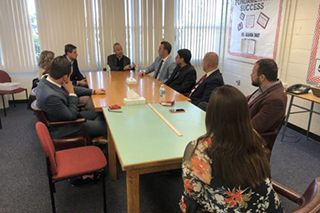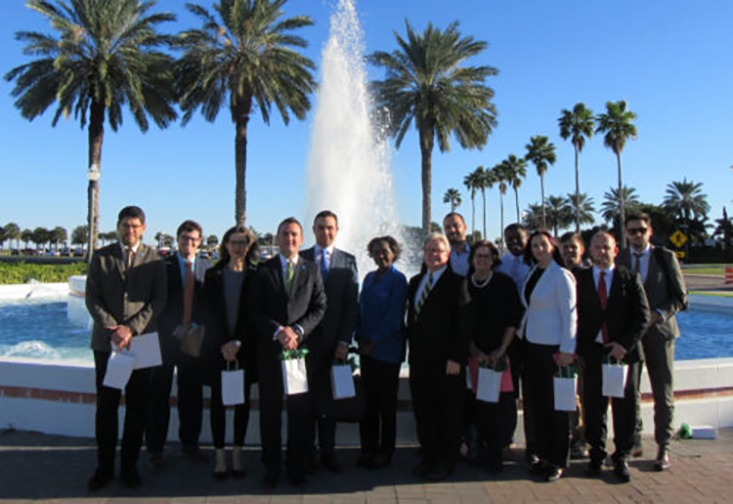A delegation of Macedonian political leaders representing a diverse cross-section of the government, political parties and institutions visited USFSP and held meetings with state and local government officials across Tampa Bay in December. The focus of the six-day visit was to demonstrate the democratic functioning of local and county government and education systems in the region to Macedonian officials.
USFSP Professor of Political Science Judithanne Scourfield McLauchlan hosted the delegation from December 9-14. She was tapped for this responsibility due to her extensive experience in Macedonia and knowledge of its government and current political situation.
During the Spring 2017 semester, McLauchlan was a Fulbright scholar in Macedonia where
she taught constitutional law and civics courses at South East European University
and at the University of Tetovo. In November, the State Department invited her to
be part of a meeting on U.S. aid priorities in Macedonia. Her time in the country
– and a previous Fulbright scholarship to Moldova – form the basis for her current
research on how civil society can strengthen rule of law
efforts.
“I am honored that the U.S. Embassy selected me as the host and excited because we have a real opportunity to work with political leaders who can go back to their country and have ideas to make positive changes,” said McLauchlan. “USFSP and Tampa Bay can be a part of that transformation.”
Macedonia has been in the midst of political change for decades. It was a part of the former Yugoslovia during the Cold War, governed under a communist regime. Macedonia peacefully gained independence from the former Yugoslavia in 1991. It instituted significant reforms and democratization efforts over the last 25 years. Yet the country has had its share of political corruption and legal and human rights abuses. A new government was formed in May of 2017.
The delegation of eight consisted of representatives from the Macedonian Office of the Prime Minister, Ministry of Defense, Ministry of Education and Science, members of various parties in the Parliament and a law professor.
“It is an optimistic time for Macedonia with a new government that could usher in a sustained period of legal and democratic reforms,” said McLauchlan. “To get members of both the ruling and opposition parties as well as Macedonian and Albanian political party leaders together on this trip is very impressive. Everyone needs to be on board in making reforms or it won’t work.”
The trip began with a lunch during the USFSP Fall 2017 Commencement ceremony, where members of the delegation spoke with Interim Regional Chancellor Martin Tadlock about trends in U.S. higher education.
“They would like to internationalize their university, but like us, they have limitations in terms of students’ ability to pay for education abroad or funds to support student and faculty engagement internationally,” said Tadlock. “The delegation was a great group of people who were highly engaged in finding ways to partner with us to offer exchanges, semester abroad opportunities and cooperative scholarly pursuits.”

From there, the delegation went on a whirlwind tour of Tampa Bay. Some of the key highlights from the nearly week-long visit included:
- A meeting with Ambassador Christopher Hill, who was the first U.S. Ambassador to Macedonia and is the current Dean of the Josef Korbel School of International Studies at the University of Denver. Hill, a former career diplomat and four-time ambassador who negotiated with North Korea, heard about the latest developments taking place in Macedonia and offered diplomatic advice;
- Visits with the Mayors of St. Petersburg and Seminole, along with additional officials from those cities, to discuss transparency in government contracts, anti-corruption measures instituted by local governments and ways to spur economic development;
- Meetings with representatives of Pinellas County Schools to discuss education policy;
- A sit down with the City of St. Petersburg Police Chief that focused on law enforcement and community policing issues;
- Meetings with public defenders, prosecutors and judges to talk about prosecution and the U.S. legal system; and
- A talk with the League of Women Voters President and Voter Service Chair on efforts to empower voters and to strengthen democratic institutions and civic engagement in Florida.
Although the delegation has returned back to their home country, McLauchlan plans to stay involved with the group as they usher in new reforms. She is also planning a return trip to conduct research and to work with civil society groups to strengthen the rule of law and civic education programs.
“I look forward to continue to engage with efforts to strengthen the rule of law through research and developing partnerships in Macedonia,” said McLauchlan.
“Hosting a delegation from an international university is important to USFSP as we are committed to globalizing the university,” said Tadlock. “We must build relationships between individuals at USFSP and their counterparts at international universities in order to develop formal agreements that can enhance the global experience for our students and faculty. I believe we did that with this visit.”
Previously, McLauchlan hosted delegations of Indonesian woman political leaders in 2005, an Australian delegation during the 2012 Presidential Election and had an India and Pakistan delegation shadow her own state senate campaign in 2014. She was also a delegate to Egypt and Morocco in 2002 and was later tapped to participate in an American Council of Young Political Leaders (ACYPL) Middle East Summit in Jordan in 2011.
The Macedonian delegation trip was coordinated with the U.S. Embassy, the Department of State and the ACYPL.
More information about the trip can be found on Dr. McLauchlan’s blog: http://jainmacedonia.blogspot.com/
